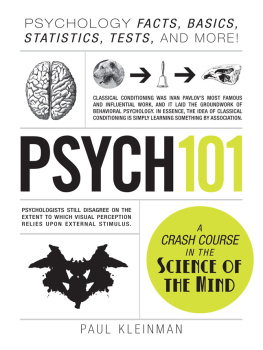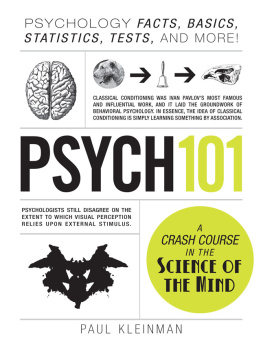Thank you for downloading this Simon & Schuster ebook.
Get a FREE ebook when you join our mailing list. Plus, get updates on new releases, deals, recommended reads, and more from Simon & Schuster. Click below to sign up and see terms and conditions.
Already a subscriber? Provide your email again so we can register this ebook and send you more of what you like to read. You will continue to receive exclusive offers in your inbox.
Psych Experiments
From Pavlovs dogs to Rorschachs inkblots, put psychologys most fascinating theories to the test
Michael A. Britt, PhD

Avon, Massachusetts
Copyright 2017 Simon and Schuster
All rights reserved.
This book, or parts thereof, may not be reproduced in any form without permission from the publisher; exceptions are made for brief excerpts used in published reviews.
Published by
Adams Media, an imprint of Simon & Schuster, Inc.
57 Littlefield Street, Avon, MA 02322. U.S.A.
www.adamsmedia.com
ISBN 10: 1-4405-9707-3
ISBN 13: 978-1-4405-9707-7
eISBN 10: 1-4405-9708-1
eISBN 13: 978-1-4405-9708-4
This book is intended as general information only, and should not be used to diagnose or treat any health condition. In light of the complex, individual, and specific nature of health problems, this book is not intended to replace professional medical advice. The ideas, procedures, and suggestions in this book are intended to supplement, not replace, the advice of a trained medical professional. Consult your physician before adopting any of the suggestions in this book, as well as about any condition that may require diagnosis or medical attention. The author and publisher disclaim any liability arising directly or indirectly from the use of this book.
Cover design by Erin Alexander.
Cover images iStockphoto.com/zizar2002/ilyast; melazerg/casejustin/123RF.
Interior images Dejan Bozic/123RF and by Claudia Wolf.
Contents
Introduction
Believe it or not, you do experiments pretty often in your day-to-day life. You may not call them that, and they may not fit the classic definition, but whenever you try to find out why something happened you are setting up an experiment. For example, imagine you get sick. You decide to figure out which food you ate yesterday made you sick. So you look for something that stands outsomething unusual that you dont do every day. You think youve identified the offending food (at least you have a hypothesis), and so you decide that today youre going to keep everything the same in your diet except for that one thing. Youre going to eliminate the possibilities. Congratulations, youre a scientist!
The only difference between you and a classic scientist is that what you do every day is a little messy scientifically speaking. You dont have control groups and impartial observers, you dont clearly define or measure your variables, and you dont run any statistics, but all these methods used by scientists are designed to do one thing: make us more careful observers so we can answer the why question with more confidence.
You may not carry out all of the studies described in this book, and thats okay, because youre still going to learn a lot about human behavior along the way. But if you do, I think youre going to have fun and learn a lot. Almost all the big names in the history of psychological experimentation are here: Pavlov, Skinner, Rorschach, Festinger, Piaget, Kohlberg, and Asch, along with other, more recent names like Seligman, Loftus, Cialdini, and Zimbardo. And youll be introduced to some of the very latest research being conducted right now by psychologists like Barrett, Eastwick, Diehl, Wiseman, and Ariely.
Psychological research is very much alive and well and far from being something thats only done in ivy towers. Psychological research is happening on websites (see the curiosity effect), in restaurants (see entry on how to increase your tips), in the courtroom (see entries on false memories and new lie detector tests), in advertisements (youd be surprised how much youre influenced by the color red), and even right on your smartphone (why you are addicted to it and whether or not taking photos with it detracts from your real-life experience).
Youll be surprised to learn what psychologists are up to these days. But as I said, even if you dont carry out a single experiment or demonstration described in this book, I think youll find that experimenting is actually kind of intriguing. Youre like Sherlock Holmes when you conduct an experiment. You survey all the evidence looking for clues (in this case, clues about the why of human behavior) and then you try something to see what happens. And after all, isnt that what scientists and all curious people do? They try things to see what will happen.
So try a few things in this book and see what happens...
Chapter 1
An Introduction to Psych Experiments
Salivating dogs, confused cats, superstitious pigeons, insightful gorillas, aggressive children, fearful adultsthe list of fascinating psychological studies goes on and on. Research on humans is colorful, odd, brilliant, embarrassing, and sometimes difficult to watch. We have learned a lot and we have come a long way since Wilhelm Wundt (the founder of psychology back in 1879) had participants listening to metronomes tick and introspecting on the experience. Today we have sophisticated personality tests and MRI (magnetic resonance imaging) scans to look inside the black box of the brain while it thinks. But just because some research is oldlike B. F. Skinners work with pigeonsdoesnt mean its old fashioned or wrong. Its still quite useful. And just because were using an MRI scan on our brains doesnt necessarily mean we understand what were looking at. We look back at Sigmund Freuds work and think about how silly some of it was. But a hundred years from now well look back at what were doing today and think the same thing.
Why Psych Experiments Matter
In this book well take a look at some of the most famous and some of the lesser-known studies in the history of psychology. I think youll find it fun even if you never carry out any of the studies described here. Here are a few examples of the odd, the brilliant, and the important studies (some of which well re-create in this book).
The Odd
What if you showed up to assist an experimenter and he said that your job was to sit in a mens bathroom stall and videotape men as they stand at a urinal and pee? Yes, that study was actually carried out in the 1970s by R. Dennis Middlemist and his colleagues. Sounds odd, but they wanted to see what effect it has on us to have someone else nearby when were... eliminating. Not surprisingly perhaps, it does take longer for the onset of micturition (peeing) to occur when someone is nearby. You probably refer to this as an invasion of your personal space. This study, while indeed a little odd, has been enormously helpful to people who suffer from shy bladder syndrome.
The Surprising
Many people fear the end of the world. Sometimes they even have a specific date (remember December 12, 2012, when the world was supposed to come to an end?). What goes on in peoples minds when they very strongly believe something like this and then the world doesnt come to an end? How do they deal with it? Leon Festinger and his colleagues decided to actually join an end of the world cult to find out what happened on that last day. This study taught us a lot about an idea called













